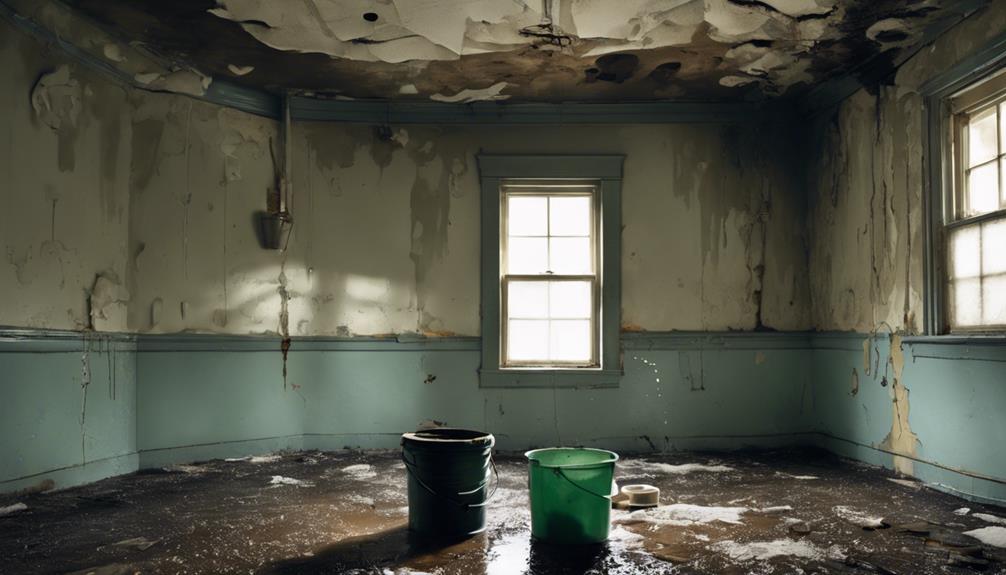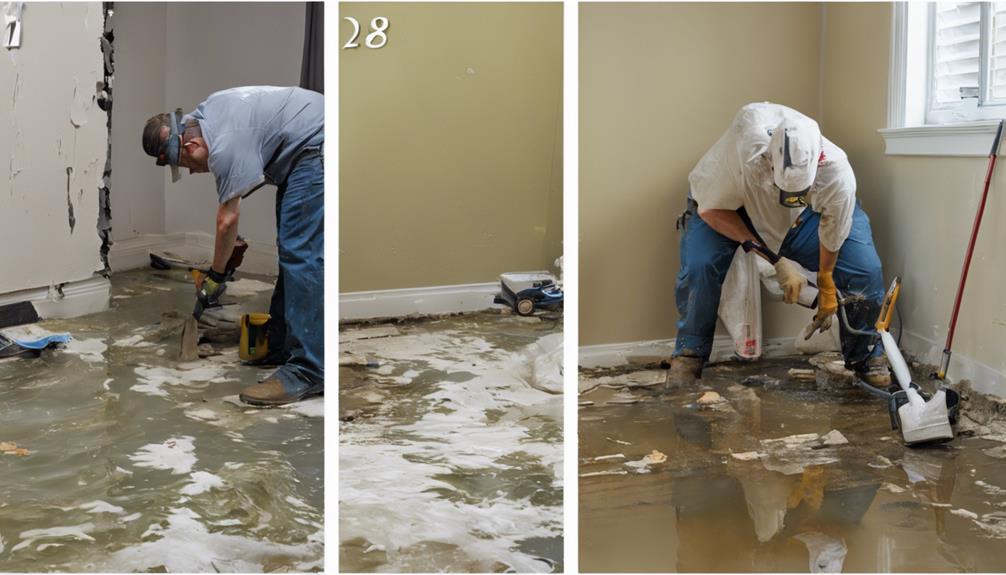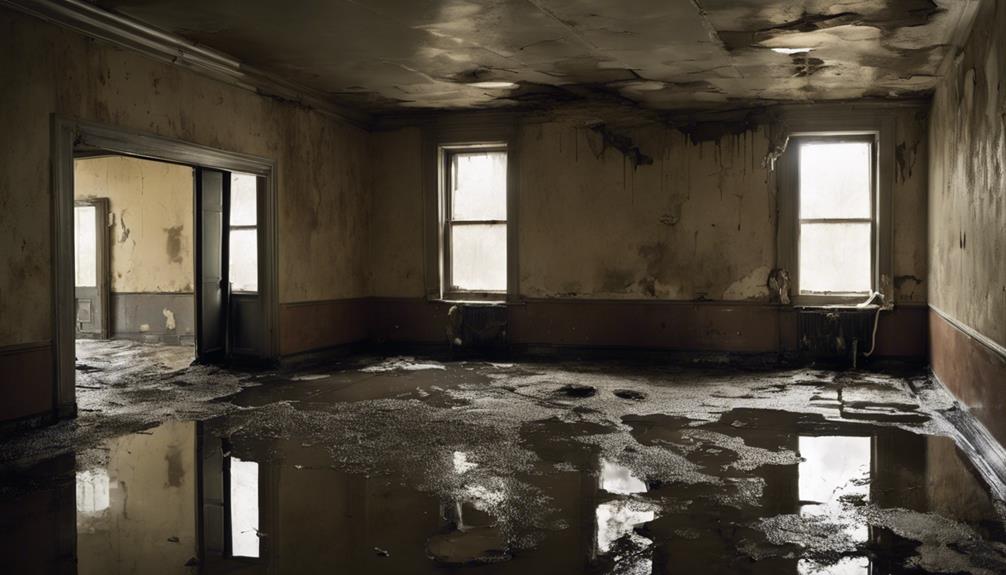
A landlord has specific timeframes to fix water damage. For urgent issues, such as severe leaks, they'll need to act within 24 to 72 hours. Non-urgent repairs, like minor mold, usually must be resolved within 30 days. It's crucial to notify your landlord in writing to establish a timeline and protect your rights. If they don't respond in a timely manner, this may lead to health risks, increased repair costs, and potential legal action. Understanding these timelines will help you navigate the situation more effectively, and there's more to know about your rights and options.

When it comes to water damage, how quickly should landlords act? Your responsibilities as a landlord are clear under California law.
If water damage poses a health or safety risk, you must tackle those urgent repairs within 24 to 72 hours. It's crucial to maintain habitable living conditions, especially since failure to address significant water damage promptly could lead to legal repercussions, including claims for breach of the warranty of habitability.
Additionally, understanding your insurance coverage for water damage can help you navigate potential financial liabilities associated with repairs.
For non-urgent repairs, you typically have up to 30 days to complete the necessary work. However, it's essential to act within a reasonable time frame to prevent issues like mold growth, which can further complicate repair costs and tenant health.
You're not just fixing the property; you're ensuring a safe and livable environment for your tenants.
Understanding the distinction between urgent and non-urgent repairs is essential for both landlords and tenants. Urgent repairs, particularly those involving significant water damage that impacts habitability, must be addressed by landlords within 24 to 72 hours according to California law. This is crucial for maintaining health or safety in the living environment.
If you notice such urgent issues, you must notify your landlord promptly in writing to initiate the repair timeline effectively.
On the other hand, non-urgent repairs related to water damage, like cosmetic concerns or minor leaks, should typically be resolved within 30 days. While these issues may not pose immediate risks, timely repairs still matter to ensure your living conditions remain comfortable.
If landlords fail to address urgent water damage within the specified timeframe, you have legal remedies available, such as withholding rent or filing a complaint.
To strengthen your position, it's important to document communications regarding all repair requests. Keeping a clear record will support your claims if landlords neglect their obligations and help ensure that you receive the necessary repairs in a timely manner.

Knowing the repair timeframes by state can really help you understand your rights as a tenant.
Each state has specific guidelines that distinguish between urgent and non-urgent repairs, affecting how quickly your landlord must act.
Let's take a closer look at what you can expect in different states when it comes to fixing water damage.
Landlords across the United States face varying timelines for addressing water damage, as state laws dictate specific repair timeframes.
In California, for example, landlords must complete repairs within 30 days, but if there's an urgent health risk, they need to act within 24 to 72 hours.
In Florida, once tenants notify the landlord of water-related issues, repairs should begin within 7 days, especially if there are immediate safety risks.
In New York, landlords are expected to address water leaks within a reasonable time, often interpreted as 24 hours for urgent issues and up to 30 days for non-urgent repairs.
Texas doesn't set specific timelines, but landlords are generally expected to handle urgent repairs, like water damage, within 7 days after notification.
Illinois law mandates that urgent repairs, including significant water damage, must be handled within 24 hours, while non-urgent issues should be addressed within 14 days.
Understanding these repair timelines can help tenants know their rights and what to expect when dealing with water damage situations.
When it comes to water damage, distinguishing between urgent and non-urgent repairs can significantly impact how quickly issues get resolved.
Urgent repairs, like major leaks that threaten health and safety, typically need attention within 24 to 72 hours, depending on your state's regulations. For instance, in California, landlords must address urgent health hazards immediately. In Florida, landlords have 7 days to start urgent repairs after you've notified them.
On the other hand, non-urgent repairs, such as minor leaks or cosmetic issues, generally have longer repair timeframes. You can expect these to be resolved within 30 days in California, although some states might allow more time.
It's crucial for you as a tenant to provide timely notification to your landlord about any water damage. This helps ensure that the necessary repair timeframes are triggered, whether the repairs are urgent or non-urgent.
When you notice water damage, it's crucial to notify your landlord in writing as soon as possible.
This not only documents the issue but also establishes a timeline for necessary repairs.
To ensure timely repairs for issues like water damage, tenants should submit written repair requests to their landlords. This formal notification establishes a record and ensures compliance with California law. Your request should clearly describe the water issue, its impact on habitability, and include relevant details or photographs to support your claim.
Under California law, tenants have the right to expect landlords to address urgent repairs, such as significant water damage, within 24 to 72 hours after receiving your written repair request. Non-urgent repairs, like minor water damage, must be addressed within 30 days. It's crucial to be specific about the problem to help your landlord understand the urgency and scope of the repair needed.
Always keep a copy of your written repair requests. This documentation protects your rights and provides evidence of your communication in case further action is required.
Prompt notification of water damage is vital for tenants to ensure swift action from their landlords. When you notice significant water damage, you should notify your landlord in writing within 24 hours. This urgent notification importance can't be overstated; it establishes a formal record and initiates the repair process.
California law requires landlords to address urgent repairs, including water damage, within 24 to 72 hours of receiving notice. By acting quickly, you protect your rights and minimize potential further damage.
Keeping a copy of your notification is crucial, as it documents your efforts and provides evidence if your landlord fails to act in a timely manner.
If you don't notify your landlord promptly, you could be held responsible for any additional damage due to neglect. If you're unsure about the notification process or your rights, seeking legal advice can help clarify your responsibilities and options.

Delayed repairs for water damage can have serious consequences that extend far beyond mere inconvenience. If a landlord doesn't address water damage quickly, you may face significant health risks, such as mold growth, which can develop within just 24 to 48 hours. This can affect your safety and well-being in the property.
Moreover, neglecting urgent repairs can lead to structural issues, which often means higher repair costs down the line—sometimes even thousands of dollars.
As a tenant, you have rights. If your landlord fails to make necessary repairs within a reasonable timeframe, you might've grounds to withhold rent, potentially leading to legal disputes. Landlords who ignore their responsibilities may find themselves facing lawsuits for breach of the warranty of habitability, along with financial penalties.
Persistent water damage not only impacts your living conditions but also compromises the property's integrity. This can lead to long-term depreciation and decreased property value, affecting both you and the landlord.
In short, timely repairs are crucial for maintaining a safe, habitable environment for everyone involved.
Numerous resources are available to help tenants navigate the challenges of water damage repairs. In California, it's crucial to understand your rights regarding urgent repairs. If you report water damage to your landlord in writing, you create a formal record, which is essential for tracking timelines.
Remember, landlords must address urgent issues within 24 to 72 hours, while non-urgent repairs typically take up to 30 days.
To strengthen your position, document the damage with photographs and keep detailed records of all communications regarding repair requests. If your landlord fails to act promptly, you may have legal remedies at your disposal. Options like withholding rent or utilizing the "repair and deduct" method can be effective, but ensure you provide proper notification first.
Additionally, local tenant advocacy groups and the County of Los Angeles Department of Consumer and Business Affairs offer valuable guidance and support for tenants dealing with unresolved water damage issues.
Don't hesitate to reach out to these resources—they can help you navigate the complexities of landlord-tenant laws and ensure your living conditions meet safety standards. Being informed empowers you to take action when needed.
In California, a landlord's timeframe to fix issues depends on the urgency. For emergency repairs, you should expect action within 24 to 72 hours.
For non-urgent repairs, like minor leaks, you might wait up to 30 days after you've submitted written repair requests.
Your lease agreement outlines these obligations, ensuring your rights as a tenant.
If they fail to meet these maintenance obligations, you can explore legal remedies to enforce habitability standards.
In California, landlords must address mold problems promptly, especially if there are health risks involved.
You should notify your landlord in writing to establish your tenant rights and their legal obligations.
Typically, repair timelines for mold remediation are around 30 days for non-urgent cases, but urgent issues need immediate action.
If they fail to act, you have tenant remedies, including withholding rent or pursuing legal action, to ensure compliance with inspection processes and responsibilities.
In California, uninhabitable living situations include serious safety violations like severe water damage, mold growth, or lack of essential services.
As a tenant, you have rights regarding habitability standards and your landlord's legal obligations. If problems arise, you must provide notice and allow reasonable repair timelines.
If your landlord fails to act, you can explore tenant remedies, including withholding rent or initiating eviction processes, depending on your rental agreement's terms.
In California, landlords must restore your water service promptly, typically within a few days if it's completely shut off.
Under water shutoff regulations, you're entitled to a habitable living environment. If your landlord neglects this responsibility, you can invoke tenant rights and pursue legal remedies.
Document your tenant notifications to ensure a clear record of issues. Emergency repairs should be prioritized, and you may also want to consider water damage insurance for added protection.
In summary, it's crucial to know your rights as a tenant when it comes to water damage repairs. Your landlord has a responsibility to address urgent issues promptly, while non-urgent repairs may take longer. Always notify your landlord about any damage and keep records of your communications. If they delay necessary repairs, you have options to seek help. Stay informed and proactive to ensure your home remains safe and comfortable.